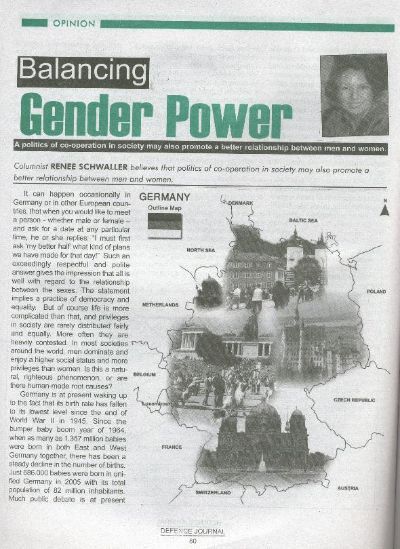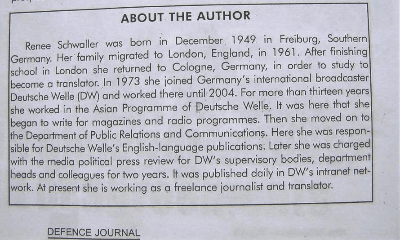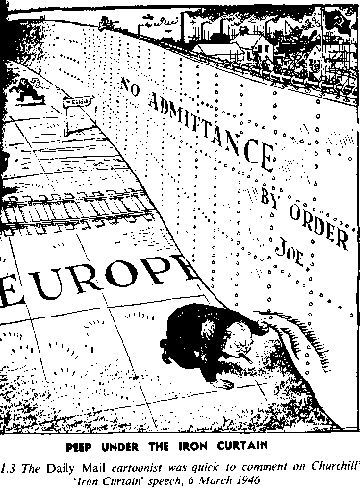
Renee Schwaller: Willkommen - Welcome
Nach 32 Jahren Mitarbeit beim Auslandsrundfunk Deutschlands, Deutsche Welle, bin ich nun freiberuflich tätig.
After having worked for 32 years as a full-time employee with Germany's international broadcaster, Deutsche Welle, I now work as a freelance translator and journalist.
:
Die neue
DEUTSCHE WELLE
www.dw.com
Der folgende Beitrag erschien im 'Defence Journal' im Dezember 2006 (siehe unter .. / Gender)
The following article was published in the 'Defence Journal' of December 2006 (see under ... / Gender)
Die Zeitschrift DEFENCE JOURNAL erschien monatlich und wurde in Karatschi, Pakistan gedruckt. Die Reichweite lag bei schätzungsweise 80.000 Lesern. Ein Übersee-Abonnement kostete 80,- US Dollar im Jahr.
The monthly magazine DEFENCE JOURNAL used to reach around 80.000 readers. It was published in Karachi, Pakistan. An overseas
subscription would cost 80,- US Dollars per year.
"Das
wahre Volk gegen alle anderen"
Rechtspopulismus als Identitätspolitik
Wie definiert man sich selbst? 'Ich will besser sein als andere, ich hab ein reicheres Leben verdient!' Viele wünschen sich das, sie
wollen aufsteigen, mehr Wohlstand haben, auf andere eher herabgucken können, als aufblicken. Aufstieg, Fortschritte, Verbesserungen,,,,, wer wünscht sich das nicht? Ohne Hoffnungen, ohne Ehrgeiz,
hätte die Menschheit nicht die Fortschritte gemacht, wie wir sie verzeichnen können. Aber auch Solidarität hilft, den Gefahren in der Welt zu begegnen. Was, wenn von weither Menschen kommen, die uns
erobern wollen? Wollen sie Land übernehmen, uns verdrängen? Standen sie vor dem Hungertod, und mussten deshalb aggressiv werden? Oder wollten sie die Rohstoffe erbeuten, um sich zu bereichern und
anderen überlegen zu sein?
Der Professor für Politische Theorie und Ideengeschichte in Princeton, Jan-Werner Müller, schreibt:
"Es gibt keinen Populismus, der ohne eine bestimmte Form von Identitätspolitik auskommt - nämlich eine, die primär dem Ausschluss anderer dient....Nationalistische Rechtspopulisten präsentieren sich
als alleinige legitime Vertreter eines als homogen verstandenen nationalen Volkes."
Die Identität, die von Rechtspopulisten heute vornehmlich ins Feld geführt wird, ist national oder auch "ethnokulturell". So gut wie alle Rechtspopulisten in
Europa sind heute nationalistisch (und dezidiert EU-kritisch). Prof. Jan-Werner Müller: "Aber nicht jeder Nationalist ist automatisch Populist." Das Wort 'Patriotismus' ist daher wohl eher die
bessere Bezeichnung für die Einstellung sein eigenes Land zu schätzen. Nationalismus und Patriotismus sind auseinanderzuhalten.
In der Opposition das 'Establishment' zu kritisieren ist ganz üblich. Sie tun aber auch noch etwas anderes, das weit darüber hinausgeht: Populisten behaupten stets, sie,
und nur sie. vertreten das, was bei Populisten in der Regel als das 'wahre Volk', oder auch als die schweigende Mehrheit beschrieben wird. Sind die Ausländer hereingekommen, um mehr Geld zu verdienen
als in ihrem eigenen Land, oder sind sie doch von den reicheren Industrieländern geholt worden? Professor Müller: „Der Alleinvertretungsanspruch der Rechtspopulisten ist vor allem moralisch. Aus ihm
folgt, dass die Konkurrenten um die Macht als grundsätzlich illegitim abqualifiziert werden müssen." Es wird behauptet, die Immigranten seien im Dienst von 'Globalisten', sie dienten nicht dem Volk,
sondern bereicherten sich.
Es geht also bei Populisten immer um Antipluralismus, und es läuft immer auf einen moralischen Ausschluss anderer hinaus. Auf der Ebene der Politik gelten alle anderen
als schlechte Charaktere und unter den Bürgern werden diejenigen, welche die Populisten nicht unterstützen, im Zweifel des Landesverrats bezichtigt.
Populisten reduzieren im Zweifelsfalle alle politischen Fragen auf Fragen nach Zugehörigkeit. Man versucht nicht, den politischen Ggegner mit Argumenten zu widerlegen,
sondern bezichtigt ihn der Korruption oder des Verrats. Man akzeptiert keine legitime Opposition (ob nun im Parlament oder bei Demonstrationen auf der Straße), sondern deklariert die Kritiker, in den
Worten Donald Trumps, gleich zu "enemies of the people" (Feinde des Volkes).
Es werden immer gerne Spaltungen vertieft. Das heißt natürlich nicht, dass alle Bürger im Konsens miteinander vereint sind. Im Gegenteil. Keine
Demokratie kommt ohne Konflikte aus, denn ohne Konflikte gibt es auch keine echten Alternativen und Wahlmöglichkeiten.
Die Frage ist nur, wie man Konflikte versteht oder auch bewusst aufstellt. Populisten werden immer gleich persönlich und hochmoralisch. Es stehen immer gute Charaktere den schlechten gegenüber.
Professor Müller schreibt, dass das völlig homogene Volk, das die Populisten anrufen, eine Fantasievorstellung ist. Sie wird aber von den Populisten als empirisch vorhanden angenommen. Deshalb
fechten auch die Populisten häufig die Wahlen bei Niederlagen an. Mit ihrem Alleinvertretungsanspruch haben sie ein logisches Problem. "Wie kann das sein?" Es wird dann behauptet, irgendjemand muss
die Mehrheit zum Schweigen gebracht haben. Im Zweifelsfall sind das die 'alten Eliten', die ihre Pfründe schützen wollen.
Sich als Bürger zweiter Klasse fühlen müssen ? Nein, das ist gerade NICHT, was moderne Demokratien umsetzen wollen. Möglichst gleiche Chancen sollen alle haben ihre
Ideale eines gelungenen Lebens zu verwirklichen. Alle Bürger, die davon abweichen, sind zu respektieren, wenn sie die im Land verabschiedeten Gesetze einhalten. So hat zum Beispiel der Oberste
Gerichtshof in den Vereinigten Staaten es für unzulässig erklärt, staatliche Gebäude - ob innen oder außen - allein mit christlichen Symbolen zu verzieren. Nicht-Christen würde dadurch nämlich
suggeriert, dass sie nicht wirklich dazugehören, beziehungsweise, dass sie vielleicht überhaupt nicht hier hingehören. In Europa gibt es aber bekanntlich Staaten, die dies anders handhaben.
Jan-Werner Müller: „Nur: MIT Populisten reden heißt nicht WIE Populisten reden. Weil Ihr ausschließt, schließen wir Euch jetzt aus." Hier würde man genau in die Falle tappen, das moralisch gute
Kollektiv gegen die anderen, schlechten Charaktere entgegenzusetzen“. Man darf beispiels-weise darauf hinweisen, dass Verallgemeinerungen über 'den Islam' größtenteils Unsinn
sind.
Doch wie entsteht so ein Populismus? Die Ursachen für den Erfolg populistischer Führer hängen immer stark von nationalen Gegebenheiten ab. Bekanntlich heißt es, sie geben
einfache Antworten auf komplexe Sachverhalte. Eine einfache Antwort wäre zum Beispiel: 'Die Globalisierung', oder: 'Die Angst der Bürger vor der Zerstörung ihrer Kultur durch
Einwanderung'.
Fatal ist jedoch, wenn diese Argumente unbesehen abgekauft werden. Wenn die populistischen Parteien behaupten, ihre Siege erklärten
sich aus Angst vor 'Überfremdung', oder gar 'Umvolkung', wird das für bare Münze genommen. Von einer Position, derzufolge alle Populisten Demagogen sind, denen man eigentlich kein Wort glauben
sollte, schlägt man ins andere Extrem um. Plötzlich wird angeommen, die Populisten wüssten irgendwie doch am besten, was im Innersten der Gesellschaft vorgehe. Sie verstünden die wahren Sorgen und
Nöte der Bürger. Statt Totalablehnung erfahren die Populisten auf diese Weise totale Akzeptanz. Sie haben so eine Art 'Monopol' auf quasi-soziologisches Wissen.
Doch dies verkennt, dass Volksvertretung ein DYNAMISCHER Prozess ist. Sie bilden sich durch die Repräsentationsangebote seitens der Politik, der Medien, aber auch durch
Zivilgesellschaft, Freunde und Familie. Das heißt, sie sind nicht in Stein gemeißelt. Es sollte aber noch einmal darauf hingewiesen werden, dass hier ein Populist nicht wirklich für die schweigende
Mehrheit spricht, sondern bestenfalls für eine (ziemlich laute) Minderheit.
Sich nur auf das 'Verbindende' zu konzentrieren, und nicht auf das 'Trennende' ist nicht die richtige Methode hier mit dem Problem umzugehen. Betont werden muss
die Bereitschaft, Rechte und Solidarität immer wieder neu AUSZUHANDELN. Dies ist im Kontrast zur Praxis der Rechtspopulisten, die das Verbindende ein für alle Mal an bestimmten Lebensformen (unsere
Art zu leben) festmachen wollen. Auch die Mehrheitsgesellschaft kann mit der Zeit sich wandeln, und Änderungen für sich übernehmen! Durch den großen Verbrauch der Energie mit fossilen Brennstoffen,
durch die vielen technischen Erfindungen der Industrieländer, hat der Klimawandel in einigen Ländern das Leben untragbar gemacht. Es kommen viele Flüchtlinge in die Zonen mit moderateren
Temperaturen, und die Welt wächst quasi zusammen. Statt 'Kontra, Kontra, Kontra, sollten wir lieber uns bemühen einander zu verstehen und voneinander zu lernen. Die 'Konflikt-Demokratie' ist
gefragt.
Pluralisierung ist kein Wert an sich. Pluralismus kann aber als Chiffre verstanden werden für die gemeinsame Bereitschaft, in vielfältigen Gesellschaften Wege zu finden, auf faire Weise zusammenzuleben. Die Idee, ein homogenes Volk, das vereint in einer vermeintlich 'offensichtlichen Art zu leben' garantiere ein gutes Leben, kann nur in einer Intoleranz münden, die mit der liberalen Demokratie unvereinbar ist. Das Volk, wie Jürgen Habermas formulierte, kann nur im Plural auftreten.
ANGST VOR KONTROLLVERLUST ?
Die Verunsicherung und Wut der Bürger. Wie können Mehrheiten und Minderheiten ein funktionierendes Miteinander erreichen?
Was hält uns zusammen?
Eine Podiumsdiskussion in Bonn zum Thema Integration
Von der Willkommenskultur bis hin zu den neu erlebten 'No-Go-Areas', in denen Clan-Kriminalität praktiziert wird, sehen
die Bürger die Migrationswelle inzwischen differenzierter und besorgter. Doch Zuwanderung ist sehr nötig geworden, und neue Fachkräfte werden dringend
gesucht.
In der Bonner Akademie für Forschung und Lehre praktischer Politik, kurz auch BAPP genannt, trafen sich im Januar viele interessante Gäste: Prof. BODO HOMBACH, Präsident der Bonner Akademie. SERAP GÜLER, Staatssekretärin für Integration im Ministerium für Kinder, Familie, Flüchtlinge und Integration im Kabinett von Armin Laschet. FRANK RICHTER, Polizeipräsident in Essen. ULRICH REITZ, Autor und ehemaliger Chefredakteur des Focus. Prof. Dr. JÖRG BOGUMIL, Professor für Sozialwissenschaft an der Ruhr-Universität Bochum. SONJA FUHRMANN, Journalistin und Moderatorin bei WDR und phoenix, leitete die Podiumsdiskussion.
Mit seinen einleitenden Worten verwies Bodo Hombach, Präsident der Bonner Akademie,
auf den polarisierenden Effekt, den das Thema der Veranstaltung auf die Gesellschaft ausübe. „Wir leben in einer Zeit, in der 'Fakes' Fakten verdrängen“ – Diese Beobachtung treffe ganz besonders auf
die Integrationsdebatte zu. Die demokratische Tugend, dem Meinungsgegner zuzuhören, müsse in derart aufgeheizten Zeiten verteidigt werden.
Zu Beginn ihrer Rede positionierte sich Serap Güler zu dem Veranstaltungstitel. Die infrage gestellte Kanzlerinnenaussage wolle sie nicht „blind“ wiederholen: „Wir schaffen das – wenn wir die Fehler
der Vergangenheit nicht wiederholen!“, lautete deshalb die Stellungnahme der Staatssekretärin. Sie betonte, dass Spracherwerb einer der wichtigsten Faktoren für gelungene Integration sei. Dies sei
erkannt worden und werde in Form von Integrationskursen heute viel stärker gefördert als noch bei früheren Einwanderungsgenerationen. Dennoch sei es notwendig, diese Angebote weiter auszuweiten.
Zudem kritisierte Güler die marginale Rolle, die die vielen Beispiele für gelungene Integration in der
öffentlichen Wahrnehmung einnehmen – ohne auf diese Weise jedoch die bestehenden Herausforderungen zu relativieren.
Siehe unter: Kontrollverlust
INTERAGIEREN oder KOLLIDIEREN
?
Einheimische und Zugewanderte: Wie sind
zwischenmenschliche
Beziehungen zu gestalten?
Die neue Wissenschaft sagt uns, dass sub-atomare Teilchen nur existieren, wenn jemand sie beobachtet, oder wenn sie mit
anderen Teilchen kollidieren. Es existiert sonst nichts, erklärt uns die Wissenschaft der Quantenmechanik, von Werner Heisenberg entdeckt. Mit anderen Worten:
Wir müssen akzeptieren, dass die Realität sich aus Interaktionen erklärt. Kein Objekt hat eine genaue Position, es sei
denn es kollidiert mit einem anderen Objekt. Es gibt nur eine Realität durch Interaktionen.
Nun kann man sagen, dass wir Menschen leider viel zu häufig miteinander kollidieren. Kriege gibt es seit Menschengedenken. Vernichtung, Mord und Totschlag. Einer tötet den anderen. Ist das der beste Weg, um zu spüren, dass man existiert? Geht es um mehr Land, mehr Ressourcen, mehr Nahrung? Doch gibt es nicht sanftere Methoden für eine gerechte Verteilung?
Ressourcen werden immer knapper, die Zahl der Menschen nimmt zu. Früher hat ein Bauer
vier Menschen ernährt, heute sind es 150 Menschen, die Nahrung über die technisierte Landwirtschaft von einem einzigen Bauer am Leben erhalten können. Doch zu welchem Preis ?
Die Bevölkerungsexplosion als Bombe
?
Im Jahr 1804 gab es eine Milliarde Menschen, im Jahr 2011 waren es bereits sieben
Milliarden. Wie lange wird die Bevölkerungszahl noch ansteigen? Wie lange geht das gut? Luftverschmutzung, Plastikteile in den Meeren, mit Nitrat verseuchte Böden, ein Aussterben
verschiedener Tierarten. Wir leben bereits über unsere Verhältnisse. Familienplanung und ein deutlicher Rückgang der Bevölkerungszahl sind geboten. 2015 lebten weltweit 244 Millionen Menschen in
Staaten, in denen sie nicht geboren wurden. Davon lebte mehr als die Hälfte in nur 10 Staaten. In Deutschland sind es mehr als 22 Prozent.
Durch die technische Weiterentwicklung, den gestiegenen Wohlstand, mit der
Gleichberechtigung der Frauen, die ebenfalls sich gut ausbilden und berufstätig sein können, hat es einen Geburtenrückgang gegeben. 2,1 Geburten pro Frau sind nötig, um die Bevölkerungszahl konstant
zu halten. In den reichen Nationen fällt diese Zahl bereits darunter. Früher haben Frauen mehr Kinder in die Welt gesetzt, da auch nur einige von ihnen überlebten. Verhütungsmittel gab es nicht oder
wurden verpönt. 'Make babies not love', beschrieben viele kritische Stimmen die Einstellung der Kirche. Nun, früher war die Menschheit tatsächlich vom Aussterben bedroht. Die Pest und andere
Krankheiten reduzierte die Bevölkerungszahl in früheren Zeiten auf ein Drittel in einigen Ländern. Die ca.200 Jahre der Religionskriege zwischen Protestanten und Katholiken, die zwei Weltkriege im
20. Jahrhundert töteten Millionen von Menschen. Da war es ratsam gut für Nachwuchs zu sorgen.
Trotz der weiterhin steigenden Bevölkerungszahl weltweit, ist Deutschland in einer
anderen Situation. Herbert Brücker, Migrationsforscher vom Institut für Arbeitsmarkt und Berufsforschung, berichtete schon vor einigen Jahren: "Wenn wir eine Frauenerwerbsbeteiligung hätten wie in
den skandinavischen Ländern, wenn wir die Rente mit 67 einführen und zusätzlich gering Qualifizierte nachschulen und ausbilden, dann steigt das Erwerbspotential um etwa 1,5 Millionen. Es geht aber,
wenn wir keine Zuwanderung haben, um etwa 18 Millionen Erwerbspersonen zurück..."
Gemeinsamkeiten
entdecken
Aber: Was hält uns friedlich zusammen, was bewegt uns, auf richtige Weise in Interaktion miteinander zu treten? Wie viel Solidarität können Menschen untereinander praktizieren? Gemeinsames Beten und Singen verbindet Menschen. Den gleichen Glauben haben. Aber in unserer Welt, die durch das Internet und die Digitalisierung immer stärker miteinander verbunden ist, gibt es sehr viele Religionen, die Millionen unterschiedlichster Anhänger haben. Religionen können auch destruktiv wirken und zu Kriegen führen. Die Rohingyas in Myanmar – ein Land in dem mehrheitlich Buddhisten leben - werden verfolgt und vertrieben. Die vielen Millionen Hindus und die vielen Millionen Muslime in Indien sind häufig aneinander geraten. Die Gesellschaft war gespalten. Mit der Unabhängigkeit, die Großbritannien Indien gewähren wollte, wurden diese Rivalitäten akut. Muslime wollten nicht von der mehrheitlichen Hindu-Bevölkerung regiert werden. Es sollte ein eigenes Land gegründet werden, auf der Basis der Religion Islam. Etwa 14 Millionen Menschen wurden zu Flüchtlingen und mussten fliehen. Es entstand der Staat Pakistan, damals West-Pakistan und Ost-Pakistan, - das heutige Bangladesch. Hindus im nördlichen Teil des Subkontinents bewegten sich Richtung Süden, Muslime in Richtung Nord-Westen oder Nord-Osten. Die gewaltige Migrationsbewegung verursachte eine horrende Zahl an Toten. Es waren etwa eine Million Menschen, die diesen Prozess nicht überlebt haben. ...................
Siehe unter INTERAKTION.........
M I L I T A R Y M I G H T
In search of some DISARMING arguments for conflict prevention
To represent a nation that started a world war and caused the deaths of millions of people around the world is a pretty heavy load for an 11-year-old schoolgirl. But this is in fact what
happened to me when my family left Germany, and we all moved to England. I was told that my behaviour would throw a light on my country, and people would have the impression that this behaviour might
be standard for all Germans. I came from the country of the ‘Nazis’ – or the ‘National Socialists’ - a term used worldwide for brutal, radical fascists to this day. I should therefore behave in a
‘correct and polite manner’. Of course my parents meant well with me and wanted me to get along nicely with my school friends and neighbours in the new country. They had experienced a devastating war
with death, destruction, hunger and the loss of homeland all along the way.
Luckily at the time I was not informed about the horrors committed by my German compatriots in detail, considering other human beings as ‘inferior’ and using them as slaves of labour and in some
cases maltreating them to the point of torture and finally death in the concentration camps. I was not to learn about all these facts until some years later.
WHAT MAKES NATIONS WISH TO WAGE WAR?
But what had made Germans so 'aggressive' and cruel? What mistakes were made where and when? Why did a country with a considerable number of successful composers of music, philosophers and
poets turn itself into a military machinery with little tolerance for anything and anybody other than what the central regime considered appropriate? Of course there was the depressing number of six
million unemployed people (out of around 62 million) in the 1930s as a result of the Wall Street crash and the subsequent depression. The forced acceptance of the "war guilt clause" by the Germans -
an over-simplified explanation of how World War I (1914 - 1918) began - and the huge amount of reparations that Germany had to pay afterwards all contributed to the burden that led to the later
disaster. In 1919, John Maynard Keynes, the economist, wrote his vigorous attack upon the Peace Settlement after World War I in The Economic Consequences of the Peace. He concentrated his fire
particularly on reparations. Keynes argued that Germany would be unable to pay and that reparations would bedevil European economies for years to come. He was proved correct. Excessive punishment
therefore, or punishment perceived to have been administered unjustly, is likely to increase hatred which in turn may lead to retaliation and therefore further violence.
When a society is undergoing a severe economic breakdown and civil institutions have become powerless, there is a strong temptation to follow leaders who propose an authoritarian course of
law and order. The latent hatred and feelings of revenge for the humiliation that was suffered by the people can easily become exploited by ambitious men - or women - to obtain positions of power for
themselves. Hitler harboured personal feelings of revenge and hatred on account of his own deficiencies and failures. These matched well with the underlying feelings of most Germans for what they saw
as having been treated unjustly. Hitler became popular when he managed to secure work for the unemployed. He did this by building motorways for the later transport of tanks, soldiers and weapons. In
other words, he invested in the military and in the armaments industry. People cheered him and overlooked the rather sinister aspects of Hitler's ambitions and plans which he had actually laid down
in his book "Mein Kampf" (My Struggle).
At the end of World War II (1939-1945), the Allied Powers, (Great Britain, France, Russia, USA), began by dividing Germany into four zones of occupation in accordance with their agreements at Yalta
and Potsdam. But ideological differences inevitably became involved in the disputes. The German fascist military machinery had been beaten, yet a new enemy appeared on the horizon. The USSR fostered
communism in the Russian zone. The failure to distribute wealth and opportunities equally among its citizens had previously led to a revolution and an authoritarian regime - communist Russia. The
other Allies in their respective zones discouraged it, the USA in particular arguing that communism would be less likely to make an appeal if economic recovery was rapid.
In 1946 Churchill declared that from the "Baltic to The Adriatic Sea, an 'Iron Curtain' has descended upon the Continent". To the east of this Iron Curtain lay the Russian zone of Germany and states
such as Poland, where communism had taken root. To the west lay the other zones of Germany and states which remained capitalist. Suspicion between the two sides hardened into a Cold War with an
almost total lack of co-operation between them. Germany was trapped in the conflict and it became clear that the German problem of being a divided country would not be solved for many years to
come.
The horrors of the Second World War war had left their mark on Germany. A popular Bavarian politician, called Franz-Josef Strauß, exclaimed in 1946 that: “may the hand drop off anyone
taking up a gun once more”. His comments were met with wide acclaim amidst all the rubble and ruins that remained after the war. But nobody’s hand dropped off when just nine years later, this same
politician became minister of defence and had German civilians conscripted and sent to the barracks to take up guns yet again. Having sided with the western allies, Germany agreed to rearmament from
1955 onwards. It was the start of the ‘Bundeswehr’ - the German army. The policy of the North Atlantic Treaty Organization, (NATO), which had been founded in 1949 and which Germany joined in 1955,
was to have a strong military force that was able to deter the communist power in the East.
Germany has to date enjoyed more than 60 years of freedom, peace and prosperity, - unique in its history. Yet finally Germany had to be persuaded to join western forces to help solve the
military aggressions by the Serbs in Kosovo (1999). With great reluctance on behalf of many politicians and citizens, but with a majority in parliament, German soldiers were sent to the Balkans into
a combat zone.
The Bundeswehr has shed former military traditions and has learnt from past experiences. It prides itself on being founded on the military resistance against the terror regime of the
national socialists. The German officers and generals of the resistance movement of the 20th July 1944, during which Hitler’s assassination was planned, have shown that in the midst of all the
barbarity and inhumanity that was taking place during the Second World War, feelings of humanity had prevailed among some courageous representatives who were willing to give up their lives for a good
cause. They wanted to end the unjust war and prevent a further loss of human life. In the light of this experience, article 1 of Germany’s constitution brought the individual into the central focus
of all state action: “The dignity of man is inviolable. To respect and protect it is the duty of all state authority” – in line with the charter of the United Nations and the Declaration of Human
Rights in December 1948: all human beings are born free and equal in dignity and rights.
“Deterrence” was for many years the key word: Being able to fight, in order not to have to fight. There has always been a big temptation to invest in military equipment. It was
military expenditure which helped both Germany as well as the United States to overcome the Great Depression after 1930, and had later helped to ‘outspend’ the Soviet Union, leading to a weakening of
the communist system. Yet spending money on arms can turn into a senseless and dangerous vicious circle that feeds itself from death and destruction. No other than the 34th President of the USA and
an active soldier and general in the Second World War, who had commanded the Allied Forces and finally became NATO Commander-in-Chief, Dwight D. Eisenhower, warned of the excessive influence of the
military-industrial complex, and the uncontrolled power which might lead to disastrous consequences and threaten peace and democracy. He knew about the horrors of the war, and warned that the next
general war could mean the end of civilization.
Between 1940 and 1996, for instance, the United States spent nearly $ 4.5 trillion on the development, testing, and construction of nuclear weapons alone. By 1967, the peak year of its nuclear
stockpile, the United States possessed some 32,000 deliverable bombs. None of them was ever used, which illustrates perfectly Keynes’s observation that, in order to create jobs, the government might
as well decide to bury money in old mines and “leave them to private enterprise on the well-tried principles of ‘laissez-faire’ to dig it up again.”
The state, its institutions and its alliances must be able to protect its citizens as well as those of its allies from outside aggression, from inside rebellions, as well as from inside or outside
uncontrolled and organized crime. Another important function is the need to protect citizens from exploitation by the state or by private elites. What is the German army’s legitimacy if not the rule
of law? The army’s task is to know the public support in carrying out its duty with a good conscience. The ‘Bundeswehr’ considers itself to be a parliamentary army and is obliged to respect the
primacy of politics. In return, the soldiers need to be able to rely on the correctness of parliamentary decisions. They are the foundation for correctly giving the order to go into action. As late
as on the 18th March 2005 the German lawmakers concluded that parliament is the legal body and representative of the people to decide on whether military operations abroad are to take place or
not.
Religions of course preach peace, but war is an unfortunate reality in this world and it causes great destruction, misery, and loss of life. Sometimes, nations unjustly go to war to take spoils from
other countries. There is a strong temptation in human beings to take advantage of others who are seen to be physically weaker. Such a reckless attitude, however, is bound to have negative
repercussions. When nations go to war, it is declared lawful by the countries going to war – sometimes for moral reasons and other times for immoral reasons. It is difficult to determine when war
would be a righteous endeavour. It should certainly be the last resort. Christians are told to love their enemy, and to treat others in the way they wish to be treated themselves. Islam – like
Christianity – permits fighting in self-defence as well as in defence of religion, or on the part of those who have been expelled forcibly from their homes. The Qur’an says: “Fight in the cause of
God against those who fight you, but do not transgress limits. God does not love transgressors.” (2: 190) And: “If they seek peace, then seek you peace. And trust in God for He is the One that
heareth and knoweth all things.” (8:61).
To fight, to kill, and to die – those are the key words when it comes to a correct sharing of the burden in missions that were initiated by the USA and its close allies. NATO allies frequently scold
Germany for leaving the dangerous operations to the Americans, British, Canadians, French and Dutch, while Germany itself wishes to merely engage in civil reconstruction. Germans should at last wake
up and ‘adapt’ to modern times. The days of Germany’s ‘special course’, i.e. its ‘checkbook diplomacy’ - which means paying instead of fighting - should be a thing of the past. And yet, adapting and
adjusting policies can be a two-way process. In its new definition of security, made public in July 2008, the United States of America have advanced a position which encompasses humanitarian,
ecological as well as military dimensions of nation-building and places them at equal levels. The main emphasis is being shifted from military operations to psychological strategies, development, and
humanitarian relief actions. The primacy of politics is to become the essence. Political empowerment, economic growth and protection of minorities are seen as necessary measures to be implemented in
order to win the ‘long war’ against radical behaviour by extremists. Finding out the root causes of the emergence of conflicts is the ultimate tool.
A consequence of Tony Blair’s controversial decision to support America’s war against Iraq has been that, as of March 2008, the Prime Minister of Great Britain is no longer able to decide a military
operation on his own. In future, he will need the approval of parliament. Merely secret operations or situations of an acute ‘emergency’ are excluded from this rule.
Likewise in France, for the very first time, the national assembly debated on the French military operations in Afghanistan. According to the constitutional amendment proposed by Nicolas Sarkozy, the
national assembly must decide on military operations abroad which exceed four months. As in Germany, any extensions of such an operation must be approved by parliament. Until this date, the national
assembly has had no right to a say in the matter.
In the United States such demands are at present also being made. In July a law was proposed which would oblige the President of the USA to consult congress before military actions.
Basically war can only be justified in self-defence. As soon as the opposite side signals the intent to stop fighting, arms should be laid to rest immediately. The more the people directly involved
are able to determine the course, the less likely that an outright war will be decided upon.
On account of its history, Germany has a particularly high number of pacifists among its citizens. Yet German soldiers are sent to many regions of the world where fighting is taking place.
In the course of the past years the number of armed conflicts around the world has been increasing. But is it leading to any success? The politics of confrontation has failed rather more than
succeeded. Europe has shown what other ways there are to resolve territorial disputes, cultural and ideological differences, inequality and an unjust income distribution – without waging war. The
countries of the European Union can look back on many decades of peace. The trouble is that this might be mistaken for weakness, - but is learning from past mistakes a weakness? Perhaps luckily, the
horrors of the past war still linger on in Europe, and people are anxious to avoid a similar disaster. Will some of these ideas find a following? War is not an enlightening prospect. Schoolboys and
schoolgirls wherever they are shouldn’t have such heavy loads to carry.
January 2009










